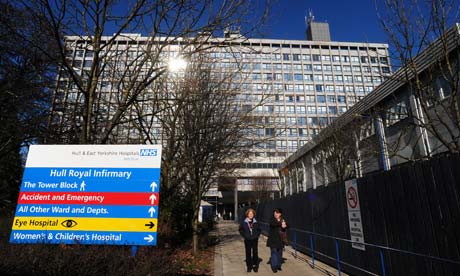Exposed: the hospitals whose high death rates are failing the NHS
Annual Dr Foster hospital guide names trusts carrying the highest risk of patients dying
• Take part in the Observer's online surgery with Dr Foster's director of research, Roger Taylor
• Take part in the Observer's online surgery with Dr Foster's director of research, Roger Taylor

Nineteen hospital trusts are today exposed as having alarmingly high death rates in a major report that also reveals how hundreds of people are dying needlessly because of substandard NHS care.
The authoritative study also identifies four hospital trusts where an unexpectedly high number of patients died after developing complications following routine operations. It names Hull and East Yorkshire Hospitals NHS Trust as the place where patients have the highest risk of dying in these circumstances – 66% above the average. Last year that equated to 33 deaths more than expected there, although it is not possible to say how many of these deaths could have been prevented. Dr Foster says the mortality rate is too high to occur by chance and is a warning sign of potential issues in the quality of care provided.
The Care Quality Commission – the NHS watchdog for England – will now investigate the trust.
Andrew Lansley, the health secretary, welcomed the report last night and increased the pressure on the NHS to improve patient safety by warning that lax procedures were costing lives.
He writes in today's Observer: "Safe care saves lives and saves money. Adverse events like high levels of infection, blood clots or falls in hospital, emergency readmissions and pressure sores cost the NHS billions of pounds a year. There is a serious human cost, too, with patients ending up injured, or even killed. Most are avoidable with the right care."
Dr Foster's report reveals that, despite recent improvements, in 2009-10:
■ Almost 10,000 patients suffered an accidental puncture or laceration
.
■ More than 2,000 had post-operative intestinal bleeding.
■ More than 13,000 mothers suffered an obstetric tear while giving birth.
■ Some 30,500 patients developed a blood clot.
■ 1,300 patients contracted blood poisoning after surgery.
Naren Patel, who chaired the National Patient Safety Agency (NPSA) until June, said some patients were dying because – as the report confirms – the NHS was still failing to provide high enough quality care in key areas, despite many initiatives from influential bodies.
"It [the report] identifies three or four key areas, such as with strokes, blood clots and prostate care, where there's evidence that optimum care is still not being delivered," said Patel. "Therefore some people do die unnecessarily because they haven't received the best possible care."
The NHS Confederation, which represents hospitals, conceded more action was needed. "There are still parts of our health system where particular services are having problems, and for the hospitals concerned this report presents an opportunity to learn and improve," said acting chief executive Nigel Edwards. "There will always be variations in any nationwide system but the golden principle must be that our NHS is safe for the patients who rely on it. This report shows where we can do better."
Peter Walsh, of patient safety charity Action against Medical Accidents, said: "This report confirms that far too little progress has been made on patient safety. Our system of regulation is failing to deliver consistently good quality care across the country or pick up on unacceptable variations and intervene."
He also accused ministers of recently backtracking on a pledge to require hospitals to always tell a patient or relatives when a blunder occurs, which could let mistakes be covered up. "Mr Lansley and the coalition government say almost all the right things about patient safety, but now is the time to see them put their money where their mouth is. The worry is that political correctness about not regulating and the financial cutbacks will mean patient safety loses out," Walsh warned.
John Healey, Labour's shadow health secretary, welcomed Dr Foster's disclosure that 30% fewer hospitals than in 2008-09 have unexpectedly high death rates. But he claimed the coalition's NHS reforms would worsen the problem. "The health secretary should make patient safety and care top of his in-tray, instead of forcing the health service through a £3bn internal reorganisation.
"Andrew Lansley has to drop his hands-off attitude to problems in the NHS and tell people in Hull [and other areas] what he's going to do to make their hospitals safer and better."
